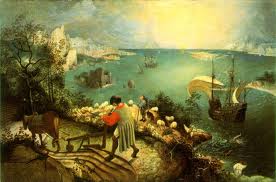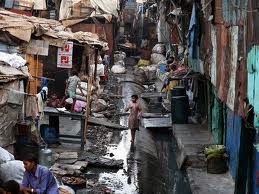============================
About suffering they were never wrong
The Old Masters: how well they understood
Its human position; how it takes place
While someone else is eating or opening a window or just walking dully along;
How, when the aged are reverently, passionately waiting
For the miraculous birth, there always must be
Children who did not specially want it to happen, skating
On a pond at the edge of the wood:
They never forgot
That even the dreadful martyrdom must run its course
Anyhow in a corner, some untidy spot
Where the dogs go on with their doggy life and the torturer’s horse
Scratches its innocent behind on a tree.
In Brueghel’s Icarus, for instance: how everything turns away
Quite leisurely from the disaster; the ploughman may
Have heard the splash, the forsaken cry,
But for him it was not an important failure; the sun shone
As it had to on the white legs disappearing into the green
Water; and the expensive delicate ship that must have seen
Something amazing, a boy falling out of the sky,
Had somewhere to get to and sailed calmly on.
–W. H. Auden



About time I left my paw print, just saying hello 😀 Warm regards Don
LikeLike
Hi there, many thanks for taking the trouble to read and like my blog. I look forward to reading your posts in the future.
LikeLike
congratz i have nominated ur blog 4 an award check it out http://moorbey.wordpress.com/wp-admin/post.php?post=14206&action=edit&message=6&postpost=v2
LikeLike
THANK-YOU so much! Your opinion means a lot to me.
Right now I am sick and can’t focus on much of anything. As soon as my head stops throbbing, though..
THANK-YOU AGAIN, from my heart.
Claire
LikeLike
Claire, I emailed you a draft post I was hoping you could look at. Let me know your thoughts…
LikeLike
OK,, will do
LikeLike
READ THIS LAST. IT’S A REPLY TO BERT’S COMMENT BELOW. (If anyone knows why this often happens, although I have clicked in the correct box, please let me know!)
Hey, Bert,
I had no idea re the background you provide. That context changes the meaning of the whole thing then? I’ve just known and cared for the poem since I was a kid, but I didn’t know its history – thank-you!
I had thought Auden was infusing a meaning of his own into the painting, borrowing the canvas for a voice, as poets legitimately do. I mean, of course he was doing that, but was he also seeking something of Brueghel’s true historic voice? Is that what you mean? That the painting records a world falling apart, not one proceeding normally on? Because the extremes you describe would have been viewed as a violent rupture, regardless of the bleak conditions of ordinary life: war was highly regulated, as I recall. So wouldn’t a massacre have shaken what had been solid ground? If those who witnessed it were prevented from speaking of it, that explains why Icarus is so tiny:
“That is Breughel’s message, says Auden, “Reality HAS been turned on its head.”
Because of course everyone stops what they are doing, gripped by horror, when children begin falling out of the sun!
LikeLike
Wonderful words, thank you Claire
LikeLike
Hey, don’t I get credit for the painting too? It’s no picnic, filling in all those tiny numbers with the right colors. But the artistic soul perseveres…
I just love to kid you, Val. Probably because I like you. But I’m never kidding about the expressions of kindness and support you always take the time to send me.
LikeLike
I think artistic needs defining in this context !
You’re welcome to kid me, Claire, as long as you call me Valerie… Val is anathema to me !!
Apologies unnecessary – I’
I’m not touchy about it, just forthright !
LikeLike
Brueghel the Elder lived in an age were suffering was our daily bread, and he disappeared in that horrible winter when people burned all the furniture they had to keep from freezing to death. The Spanish occupation did the rest. The Massacre of the Innocents was witnessed by him first hand.
LikeLike